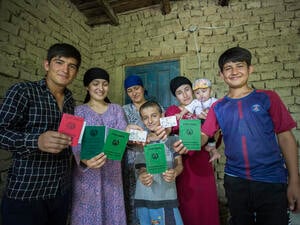Statelessness: Young Georgian mother breaks a cycle of suffering
Statelessness: Young Georgian mother breaks a cycle of suffering

Nineteen-year-old Olga Khutsishvili proudly holds her Georgia ID card in one hand and son Zaza in the other. With UNHCR'S help she managed to get birth certificates for herself and her boy.
DZEGVI, Georgia, May 8 (UNHCR) - Olga Khutsishvili has bad memories of her childhood in Georgia, growing up in poverty and lacking access to a full education and other rights. "I didn´t know how to read and write, and everybody was laughing about me. I can´t recall those years without tears," the 19-year-old told UNHCR recently in the village of Dzegvi, where she lives with her mother and baby son.
The root of her unhappiness went back to the marriage of her parents in 1980. As her Russian mother had lost all her documents, her marriage to Olga's Georgian father could not be registered. This meant that Olga's birth 16 years later was never recorded, and without a birth certificate - and proof of nationality - she lacked many rights.
But today, in a heartening turnaround made possible with UNHCR's help, she has Georgian nationality and is taking part in a UNHCR-run awareness campaign aimed at helping an estimated 2,000 other people in Georgia at risk of statelessness. "I'm not stateless anymore, and I can go to the doctor, bring my baby and enjoy the same rights as everybody else," she said.
Olga recalled that as she grew older, she became painfully aware of how important documentation was to living a normal life and accessing the rights that others take for granted. In the first town that her family lived in, she was unable to go to school or visit the doctor.
After moving to another town, Olga's mother managed to persuade the headmaster to enrol her, but the girl was not happy. "Can you imagine being in First Grade at the age of ten?" she asked her UNHCR guests. She and her mother moved again when Olga's father died and she was able to study for two years, "but without documentation I was forced to leave school again."
By mid-2013, Olga was in the same situation as her parents had been. She had a husband, but no marriage certificate, and she had baby Zaza, whose birth she could not register without documentation. It seemed as though the cycle of suffering was repeating itself.
But just when she thought her problem could go on and on for generations, she met UNHCR staff who were on a field visit to Dzegvi, meeting with vulnerable families. The refugee agency and its local partner, Innovations and Reforms Centre, told her how to get the necessary documents through the Public Registry, including papers to show she had lived in Georgia more than five years, qualifying her for nationality.
The documentation Olga gathered enabled her to become a Georgian national in July 2013 and in January last year she finally got a birth certificate and an ID card. Her mother and son, Zaza, also got citizenship. "This means a lot to me," Olga said. "Now my son will be able to get an education; I am happy he will not face the same difficulties we had."
Olga's story should encourage others in a similar situation to hers, many of whom live in isolated areas of the country and are unaware of how to resolve their situation. Georgia has shown it is keen to help end the suffering of the estimated 2,000 men, women and children who are stateless or at risk of statelessness.
"The accession to both UN conventions on statelessness, the solid citizenship law, a statelessness determination procedure and all the good intentions of the government are very important," said Simone Wolken, UNHCR´s regional representative.
"We also need to reach out and find these people - particularly in smaller towns and rural areas," she stressed. "Underprivileged for years on end, stateless people have got used to living at the margins of society. So to come forward and claim their rights, means to overcome a psychological hurdle."
To make this step easier, UNHCR has just launched an awareness campaign, including a video featuring Olga that is being aired on national TV stations. It shows how a life without a nationality leaves many scars and it informs people about the rights of stateless people. The TV spot is also part of UNHCR's global #IBelong campaign to eradicate statelessness by 2024.
Wolken also noted that Georgia had pledged to accede this year to the 1997 European Convention on Nationality, adding that this was "yet another step to end the plight of stateless persons." UNHCR plans to support the Georgian authorities in evaluating and improve its statelessness determination procedures.
Much has been done already. The total number of stateless people and those at risk of statelessness or undetermined nationality in Georgia fell from 11,000 in 2007 to some 3,000 in 2010. Since 2011, another 600 people have had citizenship granted, restored or determined, thanks to cooperation between UNHCR, the Innovations and Reforms Centre, and the Ministry of Justice.
Olga, meanwhile, is determined to become self-sufficient and provide for her family after years of living in poverty because she and her mother were not able to work legally for lack of documents. She has learnt how to read and write with the help of a nun at a reception centre vulnerable families. With UNHCR's help she now hopes to find a place at a vocational training centre. "Now I have my life back," Olga said happily.
By Nino Kajaia in Dzegvi, Georgia and Roland Schönbauer in Geneva








